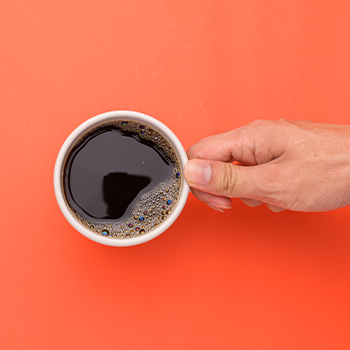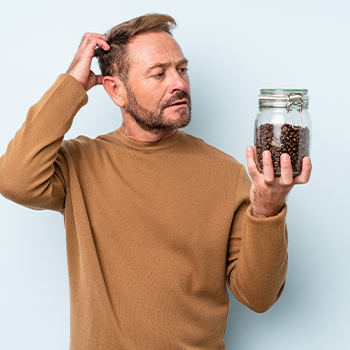Quick Summary
- Caffeine in coffee positively affects testosterone production, enhancing sex drive and sperm production in men.
- Caffeine is a nervous system stimulant found in coffee, tea, soft drinks, energy drinks, and workout supplements, affecting alertness and mood.
- A Nutrition Journal study found that men consuming caffeinated beverages had higher serum testosterone levels after eight weeks.
- From my coaching experience, I've observed that moderate caffeine consumption can be beneficial for testosterone levels, but it's important to avoid overconsumption.
Is Caffeinated Coffee Good for Testosterone?

Research indicates that caffeine positively affects testosterone production, enhancing athletic performance and muscle strength in middle-aged men.
Testosterone is the primary male sex hormone that is often associated with sperm production and sex drive.
It’s also responsible for regulating the fat distribution, red blood cell production, and muscle mass growth.
With so many men struggling with testosterone-related issues, it’s crucial to understand how caffeine consumption can help address this specific hormonal deficit.
What Exactly is Caffeine?
Caffeine is a drug that stimulates the nervous system. Increased alertness is its most noticeable effect.
In my experience, caffeine is more than just a stimulant; it's a game-changer.
Caffeine is found in many drinks such as:
- Coffee
- Tea
- Soft drinks
- Energy drinks
- Workout supplement
It speeds up the connections traveling between your brain and body, thereby improving your alertness and mood.
Recent research published in the Nutrition Journal delves into the complex relationship between caffeine, its metabolites, and testosterone levels, revealing a nuanced biochemical interaction that could significantly influence how we understand caffeine's impact on hormonal balance [1].
However, caffeine isn’t all good. Consuming too much of it may lead to several negative symptoms, including:
- Diarrhea
- High blood pressure
- Restlessness
- Irritable bowel syndrome
- Anxiety
- Insomnia
The Link Between Testosterone and Coffee

The relationship between caffeine and testosterone levels is still a topic of scientific debate. According to a Nutrition Journal study, men who consume caffeinated beverages are more likely to have higher serum testosterone levels [2].
This study was conducted over eight weeks, and participants were divided into two control groups.
One group consumed coffee with caffeine, while the other group consumed decaffeinated coffee.
Four weeks into the Nutrition Journal study, the group who had coffee with caffeine experienced significant increases in their total testosterone levels.
They reduced the amount of total and free estradiol in their bodies.
Within those four weeks, the caffeinated participants saw significant increases in the ratio of their testosterone to total and free estradiol, a potential marker for aromatase activity.
Researchers said that caffeine might act as an aromatase inhibitor that can activate testosterone production.
“Unlike most other psychoactive substances, caffeine use is socially acceptable, and the drug is widely used. Caffeine is the most commonly used psychoactive substance in the world.”
- Steven E. Meredith, Postdoctoral Research fellow at The Johns Hopkins University School of Medicine
While caffeine has been shown to potentially boost testosterone, it's not a comprehensive solution for testosterone deficiency.
If you suspect low testosterone levels, a medical evaluation and blood tests are essential to accurately assess your situation.
This will help you understand whether increasing caffeine intake could be beneficial in your specific case.
How Caffeine Affects Your Other Hormones

Caffeine influences various hormones that regulate mood, energy, sleep, and behavior.
Here's a brief overview of its impact on key hormones.
1. Cortisol
From my coaching experience, I've observed how cortisol, the stress hormone, plays a crucial role in our daily lives.
Personally, I feel its peak in the morning, especially right before a training session. It's fascinating how our body uses it for various functions, from waking us up to preparing us for physical activity.
Cortisol’s primary responsibilities include:
- Producing the “fight-or-flight” response
- Boosting energy levels
- Controlling sleep cycles
- Reducing inflammation
- Increasing blood glucose
- Managing the body’s use of carbohydrates, proteins, and fats from food
Having extremely high or low cortisol levels can be harmful. High levels can hinder brain function, slow metabolism, cause muscle weakness, and increase blood pressure, a condition associated with decreased testosterone levels [3].
On the other hand, lower levels can cause anxiety, fatigue, and mood swings. Caffeine can increase the cortisol in your body, but the level at which it is raised is unclear and would vary individually.
If a person who doesn’t usually ingest caffeine drinks large quantities of coffee, it is more likely to spike cortisol.
But if they drink coffee regularly and have a high tolerance for caffeine, their cortisol levels likely won’t rise [4].
2. Adrenaline

Like cortisol, adrenaline also provides a “fight-or-flight” response. However, it’s more of a short-term hormone, whereas cortisol works long-term.
According to ScienceDaily, caffeine can cause temporary spikes in adrenaline and give energizing effects [5]. However, it may drop later in the day and leave you feeling tired.
Research says that too much caffeine can be harmful to your adrenal glands and lead to adrenal fatigue.
So, as you drink more coffee over time, the negative effects are likely to weaken.
3. Dopamine
Dopamine, known as the 'happy hormone,' plays a key role in creating feelings of pleasure and happiness. It's released during activities like exercise, contributing to the 'runner's high.'
While caffeine doesn't directly boost dopamine levels, it does slow its reabsorption in the brain, prolonging the feel-good sensation.
This extended effect of dopamine is partly why caffeine can be habit-forming, as it consistently enhances mood.
4. Serotonin

Serotonin is another “feel good” hormone that can influence your mood, sex drive, sleep, memory, and more.
Prolonged caffeine use can cause your serotonin levels to deplete, leading to depression, change in sleep patterns, and cravings, among others [6].
If you begin to experience these adverse effects, you might want to decrease your caffeine intake.
But if you like the taste of coffee, you can try drinking decaffeinated coffee as a replacement.
5. Estrogen
Caffeine is believed to affect estrogen levels in women, but it depends on many factors.
In one study, women that ingested 200 mg of caffeine were reported to have lower estrogen levels than those who had consumed less caffeine [7].
Despite these findings, fluctuating estrogen levels didn’t seem to have any negative consequences for the women.
However, changes in estrogen levels may lead to severe medical conditions, including endometriosis, osteoporosis, and ovarian or breast cancer.
Related Articles:
How Much Coffee is Good for Testosterone?
According to a study published in Human Kinetics, doses of 400 mg or less of caffeine can potentially improve the beneficial effects of training by increasing bioavailable testosterone levels [8].
This amount is equal to four cups of coffee.
Exploring the long-term effects of caffeine consumption on testosterone levels opens up a discussion about its potential impacts on reproductive health and overall well-being, highlighting the importance of considering long-term dietary habits in hormonal health.
References:
- https://nutritionj.biomedcentral.com/articles/10.1186/s12937-022-00783-z
- https://www.ncbi.nlm.nih.gov/pmc/articles/PMC3502342/pdf/1475-2891-11-86.pdf
- https://academic.oup.com/endo/article-pdf/140/11/5112/10379287/endo5112.pdf
- https://www.ncbi.nlm.nih.gov/pmc/articles/PMC2257922/
- https://www.sciencedaily.com/releases/1999/03/990305070427.htm
- https://www.ncbi.nlm.nih.gov/pmc/articles/PMC6732540/
- https://www.nih.gov/news-events/news-releases/nih-study-shows-caffeine-consumption-linked-estrogen-changes
- https://journals.humankinetics.com/abstract/journals/ijsnem/18/2/article-p131.xml
About The Author
You May Also Like






